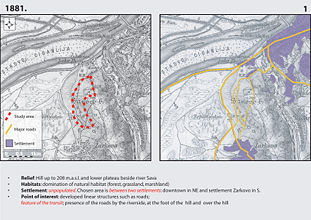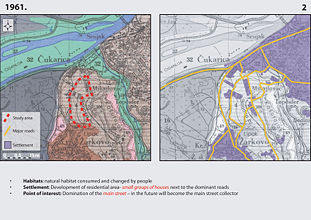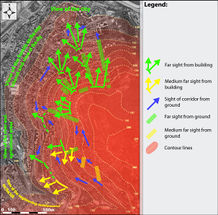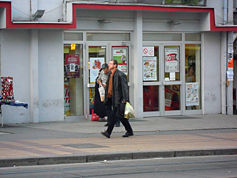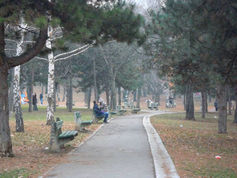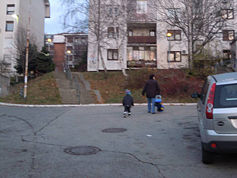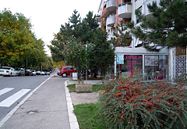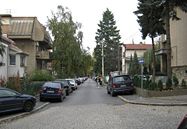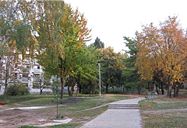Housing on the Slope
---> back to overview of Case Study List
Housing on the slope of Banovo brdo
Short Introduction to the Area of Study
The study area is located in S-W part of Belgrade, approximately 6,5km (≈4 miles) from the center. It is a part of one of the Belgrade’s hills – Banovo brdo, and includes W and N-W hillsides with total size around 1,3km2 (≈0,5 square mile). Height distance (altitude) between the highest and the lowest spot on the slope is 70 meters. Because of the specific form of relief, direction of the streets is parallel to contour lines. Steep streets, that extend perpendicular to contours, give long-distance sights. Residential area is mainly consisted of opened and semi-opened urban blocks of medium density, local park, green market and central traffic and pedestrian spine – Pozeska Street. Because it represents community collector, Pozeska Street includes some administrative, commercial and other urban functions. Neighborhood collectors and local streets contain small, private, commercial facilities. Taking into account the value of the neighboring zones (River island Ada from North, farming fields on West and park-forest Kosutnjak on East) and peaceful, almost uniformly residential part concentrated around crowded and lively Pozeska street, it is clear that this area is probably one of a kind in Belgrade. Its specific context, relief, urban structure and presence of many utilities, provides that this area and people in it operate almost apart from rest of the city. Therefore, it would be challenge to assess and improve this unusual everyday landscape.
Exercise 1: Sketching the Landscape
Time frame: October 25 - November 15, 2011
Sketches and Drawings
|
|
|
|
|
Exercise 2: Landscape Layers
Time frame: November 15 - 29, 2011
Landscape biography
- Importance of choosing the “Landscape biography” method: Neighboring zones had the biggest influence on development of the study area. Historical circumstances caused the urban growth; relief and environment had been natural framework for constellation of the settlement
Landscape analysis - introduction study for Behavior Patterns and Assessment of coherent character
|
|
|
Exercise 3: Behaviour Patterns
Time frame: December 6 - 20, 2011
Characteristic behaviour patterns
- Pozeska Street is the biggest point of interest in the study area, includes the main function spots (administration, education, shopping, entertainment…)
- Higher usage intensity of collector and trough steep streets that lead to collector; local streets along the contour lines with lower level of movement
- Local “Integrated” streets are spontaneously formed, according to lack of public spaces
- Local movement uphill by public transport, downhill mainly by walk; circulation from other parts of town to hill by public transport
Surprising behaviour patterns
- Lack of children’s playgrounds – they exist in Park and in open block with new multistory buildings (SW of the area)
- Local streets often used as children’s playground (integrated street)
- Modern construction provides intimate micro ambient, but they are rarely used
Correspondence of space and behaviour
- Small physical capacity of area; people have adapted to these conditions
- The main nonconformity: lack of parking space
- Streets at a greater distance from the Pozeska Street are still peaceful with low intensity of movement
|
|
|
Exercise 4: Communication Concepts
Time frame: December 19, 2011 - January 17, 2012
- Based on the different landscape assessment approaches students will develop a communication concept for their area of study
- Which measures would be necessary for enhancing the awareness for the area?
- Students are free to choose their method.
- Yourimagename.jpg
your image text
- Yourimagename.jpg
your image text
- Yourimagename.jpg
your image text
- Yourimagename.jpg
your image text
- Yourimagename.jpg
your image text
Please publish your findings here
Image Gallery
References
* Please make sure that you give proper references of all external resources used.
* Do not use images of which you do not hold the copyright.
* Please add internet links to other resources if necessary.
About categories: You can add more categories with this tag: "", add your categories













